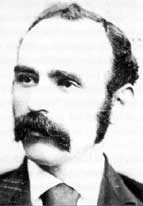9 February 2006 Edition
Remembering the Past - Mayo's story of struggle

Michael Davitt
On the week of the 30th anniversary on hunger strike of Mayo republican Frank Stagg, Shane Mac Thomáis looks back at 120 years of Mayo involvement in the national struggle
What eventually became known as the National Land League was initially formed in County Mayo in 1879 by Michael Davitt, James Daly, and others. It endeavoured to bring about the greatest social change ever witnessed in Ireland.
Davitt, who was born at Straide, County Mayo and James Daly from Boghadoon, near Lahardaun, both played a crucial role in the early land agitation in Mayo which started at a meeting held in Irishtown, near Ballindine, County Mayo, on Sunday 20 April 1879. The meeting, attended by a crowd of 10,000, arose from the threatened eviction of a number of tenants for arrears of rent from the estate of a local absentee landlord.
The new departure
On 1 June 1879 in Dublin, Fenian leader, John Devoy, Michael Davitt and Charles Stewart Parnell, agreed on 'The New Departure', whereby Fenians and constitutional nationalists agreed to combine in a struggle to reform the Irish land-system. A week later Parnell urged tenants in Westport "to hold a firm grip on your homesteads and lands". His call came as Potato Blight was spreading once more through the West, and the number of evictions for non-payment of rent was rising steadily.
On 16 August, under Davitt's leadership, the National Land League of Mayo was founded in Castlebar, and two months later the campaign moved well beyond the borders of Mayo with the inauguration in Dublin of the Irish National Land League, with Parnell as its President and Michael Davitt as one of its secretaries.
The Land agitation destroyed servility and paved the way for the emergence of republican ideals. Under the provisions of the Local Government Act 1898, Grand Juries (which consisted of the chief landowners in each county) were abolished and replaced by county councils with a significant extension of local democracy. The change saw some readjustments to county boundaries including Mayo. These developments were aided by the Gaelic Revival of the late 19th and early 20th Centuries.
John MacBride
 After the rebellion of 1916, 14 of its leaders, including a Westport man,
Major John MacBride, were executed. MacBride had led the Irish Brigade in
the Boer War in South Africa against the British, and was married for a time
to Maud Gonne the founder of Inghinidhe na hÉireann. Their son, Seán, became
Chief of Staff of the IRA and winner of the Nobel and Lenin Peace Prizes.
After the rebellion of 1916, 14 of its leaders, including a Westport man,
Major John MacBride, were executed. MacBride had led the Irish Brigade in
the Boer War in South Africa against the British, and was married for a time
to Maud Gonne the founder of Inghinidhe na hÉireann. Their son, Seán, became
Chief of Staff of the IRA and winner of the Nobel and Lenin Peace Prizes.
Tan War
The historic general election of 1918, in which Sinn Féin candidates won a landslide victory, led to the establishment of the First Dáil in January 1919.
These developments were followed by the Tan War, with a number of incidents in County Mayo, notably at Foxford, Islandeady, Toormakeady, Kilmeena and Carrowkennedy near Westport.
Perhaps the most famous incident to occur in East Mayo during the Tan War was the aborted bombing of Ballaghadereen RIC Barracks. A bomb had been prepared and transported to the town in a cart of hay but the daring mission had to be called off after British troops came across some IRA Volunteers preparing to push the cart towards the station. The bomb was seized by the British and defused in a bog several miles from the town. The blast was so powerful it broke windows in Ballaghadereen.
Ballaghadereen was one of the hotbeds of the Tan War and several Volunteers recall the damage that was caused to the town when it was attacked by the Black and Tans in 1921. One Volunteer, Capt Paddy Boland, was brutally murdered by the Tans in the village of Tooreen; others were savagely beaten and maimed for life.
Seán McNeela
 Mayo Republicans would continue to help the struggle for Independence
through the Civil War and afterwards and the county had the honour of
burying three of its sons who died whilst on hunger strike for POW status.
They were Jack "Seán" McNeela. He died on 19 April 1940 in Arbour Hill
Military Detention Barracks, Dublin, after 55 days on hunger strike. Michael
Gaughan who died on 3 June, 1974, after 64 days on hunger strike in
Parkhurst Prison, England and Frank Stagg, of Hollymount who died on 12
February 1976 after 62 days without food.
Mayo Republicans would continue to help the struggle for Independence
through the Civil War and afterwards and the county had the honour of
burying three of its sons who died whilst on hunger strike for POW status.
They were Jack "Seán" McNeela. He died on 19 April 1940 in Arbour Hill
Military Detention Barracks, Dublin, after 55 days on hunger strike. Michael
Gaughan who died on 3 June, 1974, after 64 days on hunger strike in
Parkhurst Prison, England and Frank Stagg, of Hollymount who died on 12
February 1976 after 62 days without food.


